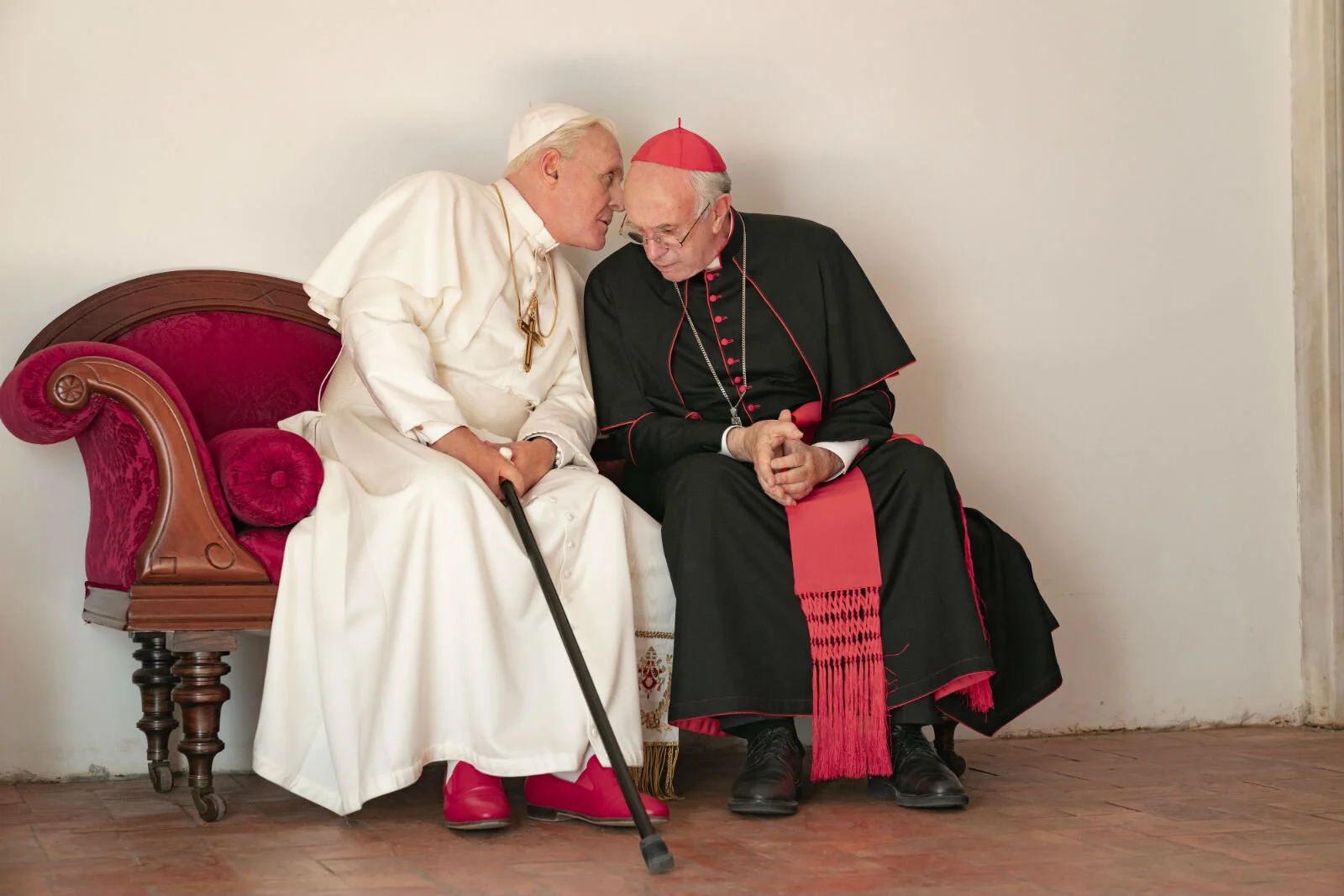The Two Popes: Great Performances Buoy So-So Drama about Catholicism’s Top Guns
By Kim Hughes
Rating: B
The very opposite of kinetic, director Fernando Meirelles’ (City of God) The Two Popes is a slow-moving, ruminative, dialog-driven think piece set to film which might enjoy a successful second life as a stage production, and might actually be better served by that forum.
Hopkins and Pryce, together at last.
The jury is out on whether Catholics of the world will draw comfort or insight from this apparently fact-based story about two contemporary popes — the outgoing Pope Benedict XVI, Joseph Ratzinger and the incoming Pope Francis, Jorge Mario Bergoglio — who spend long stretches of the film batting around barbs on being woke (well, in so many words), past indiscretions, and what it means to be spiritual leader to a billion-plus people.
It’s 2005 and beloved Pope John Paul II has died. Cardinals from across the globe gather in Rome for a papal conclave to determine his successor. Heir apparent Ratzinger wants the job. A quick and testy exchange in a restroom between Ratzinger and Bergoglio sets the tone for what’s to come later in the film. Ratzinger nails the gig, and quickly immerses himself in the job’s glory and many attendant comforts. The humble Bergoglio returns to Argentina to administer to his flock.
Fast-forward to 2012 and Bergoglio wants to step down as Cardinal so as to better lead a subservient life. He lands in Rome to gather the Pope’s permission. But Ratzinger — the rigid arch-conservative academic to Bergoglio’s free-spirited, modern everyman — refuses the resignation, citing Bergoglio’s criticisms of him, and arguing such a move would amount to bad optics for the church. So begins the back and forth which propels the film.
There’s little doubt The Two Popes would deflate without lions Anthony Hopkins and Jonathan Pryce in the leading roles. Both are reliably excellent: Hopkins as the physically failing but interminably agitated Ratzinger and Pryce as the wily, modest, football-loving Bergoglio. A long stretch in the film’s second act covering Bergoglio’s controversial involvement in Argentina’s so-called Dirty War of the mid-1970s levels the playing field somewhat for Ratzinger, but it’s clear which side director Meirelles and screenwriter Anthony McCarten (The Theory of Everything, Darkest Hour) fall on. Go Bergoglio or go home.
It impossible not to discuss the film’s politics, particularly its handling — or lack thereof — of recent sex abuse scandals, and those seeking contrition on the matter will be let down. But as an observant Catholic friend pointed out, it’s debatable if that most recent scandal is greater or lesser in the fabric of a church that has withstood myriad world wars, blights, genocides and other atrocities across the millennia.
My friend added that, in that respect, The Two Popes got it right; chronicling the title characters’ broader existential queries is more likely what went down between the two, not a specific debate about horrendous crimes perpetuated against children by priests and concealed for decades by cardinals. Make of that what you will.
The film’s closing scenes showing chummy camaraderie between the former adversaries, abetted by real-life footage of the actual popes, ties things up neatly and sends us on our way with light in our hearts. But we emerge no wiser about the fuel driving the Catholic machine.
The Two Popes. Directed by Fernando Meirelles. Written by Anthony McCarten. Starring Jonathan Pryce and Anthony Hopkins. Opens November 29 at Toronto’s TIFF Bell Lightbox; December 6 in Ottawa and Montreal; December 13 in Vancouver, Calgary, Edmonton, Winnipeg, and Victoria; and launches globally on Netflix December 20.

